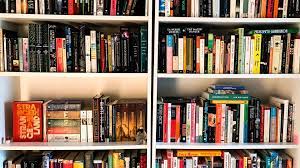
Fallout from the ongoing pandemic has affected all aspects of life — many in negative ways, as might be expected, but some in positive ways, too (even if your name isn’t Jeff Bezos). One of the more pedestrian positives? Warming relations between you and your books.
First let’s look at England comma Jolly Olde. According to book sale monitor Nielsen BookScan, over 200 million print books were sold in England during 2020 — the first time that rampart had been scaled since 2012.
In the Somehow-Still-United States, news for 2020 book sales was equally good. NPD BookScan reported an 8.2% increase in sales from 2019, clocking in at 750.9 million sales — the largest annual American increase since 2010.
Book spines have joyfully photo-bombed us during this pandemic, too. Or maybe Zoom-bombed is a more accurate term. How many talking heads have appeared on our screens with books leering and mugging from over their shoulders? This is usually intentional, of course. Rather than broadcast with the expensive clothes hanger (read: Peloton) in the background, Zoomers set up shop before bookshelves with strategically-placed spines showing both outstanding posture and pedigree. That or they “set up” before strategically-placed illusions (known in the chicanery business as “credibility shelves”).
Not that anyone’s complained. During meetings, looking at book titles behind people gives us something to do while they yammer on. You see self-help books and say, “Hmn.” Or tomes on the Reformation in 16th-century Germany and say, “Interessant!” Or Donald Trump, Junior’s, book Triggered and say, “Seriously?” Or possibly Jean-Paul Sartre’s Being and Nothingness, leading to “Yeah, right!” (that’s English for “Oui, droit!”)
You see, books speak clothbound volumes. Paperback volumes, too. About who we are (if we’ve read them) or who we wish we were (if we haven’t). Our relations with our books go deeper than we suspect. They say something about our personalities.
Though the following list is not definitive, here are 9 Ways Our Books Are a Rorschach of Who We Really Are.
1. We are ambitious. Are some of your books fat, like Lucy Ellmann’s Ducks, Newburyport (1040 pages), David Foster Wallace’s Infinite Jest (1,088 pages), or Stephen King’s It (1,168 pages)?
2. We hide our old Monarch Notes (or modern SparkNotes) well. As evidence, I give you leatherbound classics on the shelves competing with your expensive red wine in the aging well category. Check tops of books for dust.
3. We are detail-oriented. Some people arrange their bookshelves by color (at first I thought this was a joke, but I looked it up and it’s a thing!). Others arrange books by topic. Or genre. Or year purchased. Or height (tall boys to the left, shorties tapering right). Or alphabetically by author’s last name (it’s the frustrated librarian in us). Or — wait for it — not at all!
4. We can be depressing. Do you lay your books on their backs or stomachs? Are you a horizontal couch sort vs. a stand-tall vertical one? Do you realize how difficult it is to pull a book from the bottom of a prostrate heap? Like the old tablecloth trick, that. Pull fast and hope nothing falls to the floor as breaking news (cue CNN).
5. We can be one-trick ponies. I once saw a shelf that was all mysteries. Agatha Christie, Alexander McCall Smith, Sue Grafton, etc. Or pick a genre, any genre. Some bookshelves are just. all. that. Some readers know what they like, that’s all. They’re like me at the ice cream stand selling 100 flavors — I still order black raspberry chip on a waffle cone every time.
6. We can be kind to orphans. Library books have a place in every reader’s house, too. A temporary place. When I visit Dewey’s Decimals at my local library, I sometimes peek at the “Date Due” sticker in the back. If it’s an empty grid, I next look for the date the book was entered. Recently, in the 811’s, I found a copy of Adrian Blevin’s Live from the Homesick Jamboree that had been stamped into circulation on July 24, 2015. For over six years, no one had taken this little gem home! Like a foster parent at the ugly dog shelter, I had to check it out and read it front to back (and like the Ugly Duckling, it was pretty impressive). That’s for you, Adrian!
7. We can cry for help or seek the Holy Grail of Perfection. When you see titles like The 7 Habits of Highly Effective People, 12 Rules for Life, and How to Win Friends and Influence People, you know books are answering the call. Whether they’re answered or not is another thing (maybe saying something about the reader, maybe saying something about the writer).
8. At times, we can cut lines. Two words: “Credibility” and “Bookshelf.”
9. We can be messy. Maybe your system is like mine — no system. Maybe your books like where they may (or may not) land. Maybe you own a copy of Marie Kondo’s The Life-Changing Magic of Tidying Up and leave it precariously atop a mish-mash of books. Maybe you refuse to hand over one of your darlings by saying “They all spark joy, and I’m not letting a single one go!” Maybe you dog-ear pages instead of using bookmarks, which horrifies some people. Maybe you annotate in the margins, which horrifies the remaining people. Maybe you even EAT and DRINK while reading, leaving crumbs for the ages in the book’s crevice (spelunking, anyone?) and red wine-stained pages for the ages that look a lot like Gorbachev’s forehead.
Whatever, any of the above can be a reflection of who you are, all through the medium of books. Whether they’re accurate or not will take some research. If someone who knows you well comes over, reread the 9 Ways. Then meet them in the reference section for further discussion.
